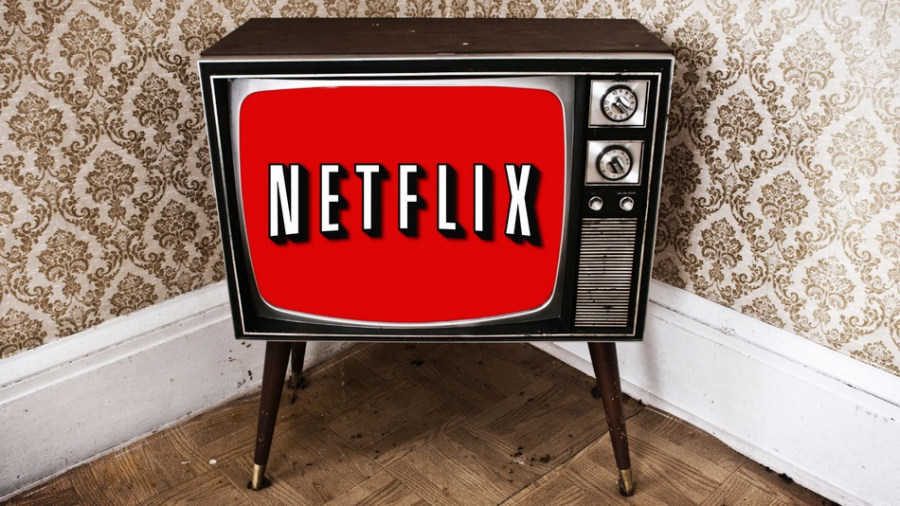The Death of Monoculture
January 8, 2019
In the cold, dreary month of January, the show Roots premiered on televisions across America in 1977. For eight consecutive nights, families crowded around their television sets to watch ABC’s miniseries that racked up over 100 million viewers. The shared interest and excitement had caused audiences, media, and even political figures like Ronald Reagan, who would later become the 40th president of the United States, to discuss the popular topic.
That was what media was like for Ms. Costello growing up, now a librarian at Pentucket High School. Before the Internet was created and provided widespread media to users in the years to come. At the time, most Americans only had primary networks and basic programs. Instead of a wide selection of television shows and movies that are available at a press of a button, many television sets only had certain stations, such as ABC, NBC, CBS, and a series of local stations.
“It was rare if you did not get to see [Roots],” Ms. Costello remarked. With the amount of channels available, the show was very accessible for most families in the 1970s. In fact, 16 percent of the United States’ population in 1977 had watched the last episode, a vast number compared to the viewings television shows receive today.
Due to the lack of media during this time, American society had revolved around the concept of monoculture. Monoculture is when a society preserves a shared national culture by excluding external influences.
For many years, the population of the United States had shared many interests and views on media due to the fact that there was so little of it. However, in the late 20th and early 21st century, the external influence that changed the shared culture in America and many other countries was the Internet.
The introduction of the Internet helped improve society for people in multiple ways. Businesses could expand their products to other individuals that were excluded from their society; people could quickly connect with one another; media, such as music, television, and movies, could be played in a variety of ways that expanded people’s viewpoints. In some ways, the world could be accessed in a matter of seconds.
Conversely, through the Internet, the idea of monoculture began to fade away. Instead of sharing a similar culture with others, people were able to join other communities, experience different cultures, and explore their own personal interests. As a result, society’s formal view unanimous culture shifted to one that revolved around each individual person.
Though the idea of monoculture disappearing was seen as an important sign that many populations were adapting, some like Ms. Costello believe otherwise.
“We have too many options,” Ms. Costello said regarding how media is portrayed today. “I find it very sad. If you think about the Internet, cable, TV, Netflix, Hulu, all those different options, there is literally thousands and thousands of things to watch on the television.”
Compared to the limited amount of television programs available before the Internet, the number in 2018 has skyrocketed. According to a recent analysis by Business Insider on Netflix’s streaming options, the total number of television series is 1,569, making up over 28 percent of the total media the company has offers. And since 2010, the number of television shows has grown significantly since its original 530. In eight years, the amount of TV shows had a 296 percent increase.
Ms. Costello also describes how the Internet contributes to the amount of information and media Americans receive.
“One of the problems with the Internet is that […] everyone thinks that the Internet is free and it’s giving you all of the information. But what they don’t realize is that when you type in your topic into your search engine, you’re only getting back things that you’re interested in.”
“It’s called the filter bubble,” Ms. Costello explained. “You’re not getting back all information. You’re only getting back information that [search engines and commercial companies] have deemed you would be interested in. […] Because of that, we’re not getting it all.”
However, Ms. Costello does believe that the loss of monoculture has brought positive changes as well. “We do accept people,” she explained. “It has allowed for more diversity because anything goes. Anything goes in our culture now. As a result of that now, the LGBT community is accepted for the most part.”
Regardless of the significant changes made to monoculture and society, Ms. Costello emphasized the importance of “having a common culture.” When remembering the idea of monoculture and how millions of people watched the show Roots during the cold winter nights in January 1977, she commented, “I think there was something comforting about all watching the same thing at the same time. There’s something comforting about that.”
Sources:

